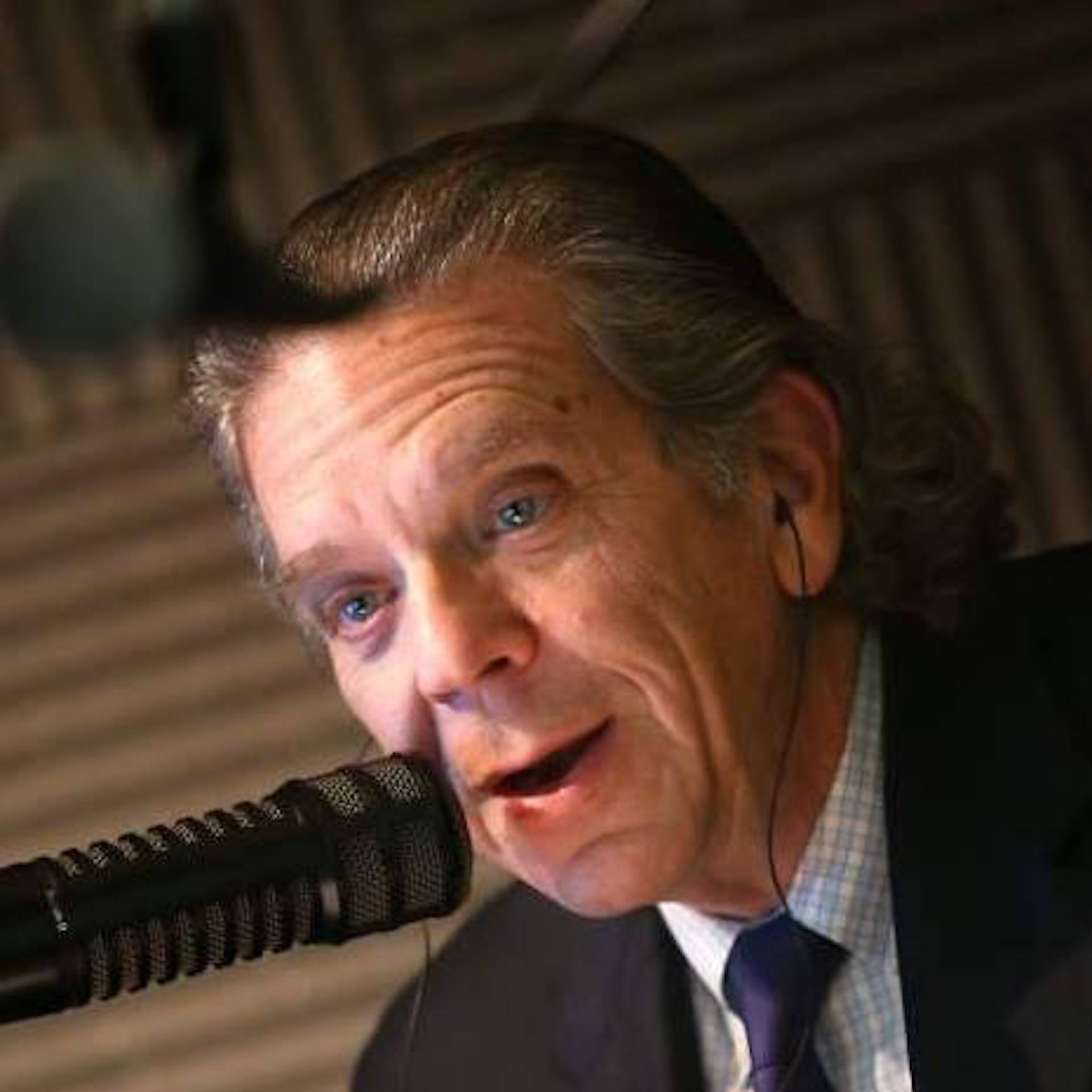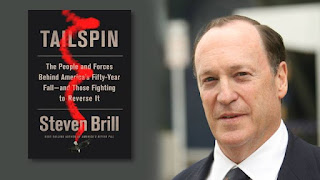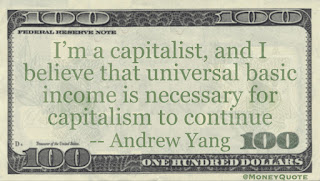Episodes
Tuesday Jun 19, 2018
The Ultimate Silicon Valley Scam
Tuesday Jun 19, 2018
Tuesday Jun 19, 2018
 By now we are all familiar with crimes and criminals on Wall Street. Bernie Madoff, Enron, Ivan Boesky, Barry Minkow and many others that have become household names. On the West Coast, the startup world of Silicon Valley had been somewhat spared from this taint. The world of “insanely great products,” “do no evil,” and “bringing friends together,” has, at least until recently, kept it’s patina.
By now we are all familiar with crimes and criminals on Wall Street. Bernie Madoff, Enron, Ivan Boesky, Barry Minkow and many others that have become household names. On the West Coast, the startup world of Silicon Valley had been somewhat spared from this taint. The world of “insanely great products,” “do no evil,” and “bringing friends together,” has, at least until recently, kept it’s patina.
Yet in a world where people want to see the future and want to be a part of it, it certainly was a fertile ground for fraud. And no one perpetrated a greater fraud than Elizabeth Holes and her company Theranos.
The story of a company whose mission was to tell you everything about your blood, with a simple finger prick, seemed too good to be true. And like most thing that seem too good to be true, it was.
John Carreyrou is a two-time Pulitzer Prize-winning investigative reporter at The Wall Street Journal. He has, from the beginning, been the leader in telling the story of Elizabeth Holmes and Theranos. His book, soon to be a major motion picture, is Bad Blood: Secrets and Lies in a Silicon Valley Startup
My conversation with John Carreyrou:
Wednesday Jun 13, 2018
Things Can Always Get Worse in America...And They Often Have
Wednesday Jun 13, 2018
Wednesday Jun 13, 2018
 I assume that most of you believe that the state of America has seldom been worse. Racial progress, America as a melting pot, the global alliance that has seen us through the past 75 years, character, civility, and liberal democracy itself, all seem to be under siege. While this is all true, it's also true is that we’ve been here before.
I assume that most of you believe that the state of America has seldom been worse. Racial progress, America as a melting pot, the global alliance that has seen us through the past 75 years, character, civility, and liberal democracy itself, all seem to be under siege. While this is all true, it's also true is that we’ve been here before.
There have been many dark moment in American history. Maybe there is something in our very DNA that sets us up for it. But certainly from the Alien and Sedition acts though the Civil War, the industrial revolution, America First, the great depression, Jim Crow, the cold war and the tyranny of Joe McCarthy, we’ve seen that bad things happen to good countries.
Each time though we have emerged stronger. We have understood that the fault was not in our stars, but in ourselves and so we have reached deeply within ourselves for our better angels. But as the pundits of Wall Street ask all the time, is it different this time? This is the heart of Pulitzer Prize winning historian and best selling author Jon Meacham's latest work The Soul of America: The Battle for Our Better Angels
My conversation with Jon Meacham:
Monday Jun 11, 2018
The Country's Collapsing...and the Ratings are Great
Monday Jun 11, 2018
Monday Jun 11, 2018
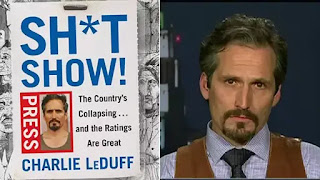 Everyday we get another glimpse of just how divided America is. The racial training at Starbucks, the horrendous tweets from Roseanne Barr, and the ongoing collection of psychotic hate filled lies from the president, are just some recent manifestations.
Everyday we get another glimpse of just how divided America is. The racial training at Starbucks, the horrendous tweets from Roseanne Barr, and the ongoing collection of psychotic hate filled lies from the president, are just some recent manifestations.
To try and understand it all, Charlie LeDuff takes the journalistic admonition to “go here,” and puts it on steroids. Charlie is part of the great tradition of participatory journalists, people like George Plimpton, and David Foster Wallace. In his latest work Sh*tshow!: The Country's Collapsing . . . and the Ratings Are Great, what he participates in is America as it is today. And for him, it is splintering, collapsing and headed down the drain and in his view, no one is really talking about it.
My conversation with Charlie LeDuff:
Monday Jun 11, 2018
Conversations with Anthony Bourdain
Monday Jun 11, 2018
Monday Jun 11, 2018
 Since last weeks tragic news, many have spoken of the multiple talents of Anthony Bourdain. Over the years I had the privilege of learning about Bourdain, in his own words.
Since last weeks tragic news, many have spoken of the multiple talents of Anthony Bourdain. Over the years I had the privilege of learning about Bourdain, in his own words.
Beginning all the way back in 2002, I had the opportunity to speak with him several times. We talked about foods around the world, the lure of the restaurant business, the depressing state of food culture in America, how he got his start, and what it meant to be chef today. He told me that what he did was "like running away with the circus."
What follows are some clips from those conversations.
Thursday Jun 07, 2018
Suicide Among The Best And The Brightest: Portraits of Resilience
Thursday Jun 07, 2018
Thursday Jun 07, 2018
 The great songwriter Johnny Mandel wrote in the theme song for MASH, that “Suicide is Painless.” It’s not. The emotional pain and depression that often leads to it is anything but. Moreover the pain for the survivors is unfathomable.
The great songwriter Johnny Mandel wrote in the theme song for MASH, that “Suicide is Painless.” It’s not. The emotional pain and depression that often leads to it is anything but. Moreover the pain for the survivors is unfathomable.
Yet we have witnessing an epidemic of suicide among some of best and brightest young people today. Suicide is now the second leading cause of death among college students.
And back in 2014 and 2015, even such an esteemed institution as MIT experienced a suicide cluster, resulting in the death of 6 students and 1 faculty member.
Because of its deeply personal nature, the search for symptoms and causes needs to be more personal than clinical. After the MIT suicides an MIT computer science professor, Daniel Jackson, set out to do something to begin to understand what had happened and to help others.
What he did, reached not into the pharmacy, but into the soul of his students. These end result is Portraits of Resilience.
My conversation with Professor Daniel Jackson:
Monday Jun 04, 2018
Bobby Kennedy May Have Been The Last Genuine Progressive
Monday Jun 04, 2018
Monday Jun 04, 2018
 There are many that believe that solution of our fractured politics is simply for individuals to take power from the grassroots. That bottom up organizing is the antidote to the wave of authoritarianism that is sweeping the world.
There are many that believe that solution of our fractured politics is simply for individuals to take power from the grassroots. That bottom up organizing is the antidote to the wave of authoritarianism that is sweeping the world.
The counter to that argument is that even with committed grass roots efforts, charismatic and effective leadership is essential.
The 60’s represented the end of consensus politics in America. Since that time we have been searching for the politician or leader that could restore that. The irony has been that in this time of hyper polarity, it’s been impossible for that leader to emerge. So we look back to what might have been. And when we do, the image, the mythology and the reality of Bobby Kennedy rises as an apparition from the body politic.
He had a unique ability to to match an empathetic and compassionate agenda with the instincts of a street fighter. Something the left has not been very good at. As we mark the death of Bobby Kennedy today, I’ve joined by Richard Allen, the author of RFK: His Words for Our Times
My conversation with Richard Allen:
Saturday Jun 02, 2018
The American Tailspin: Can We Ever Pull Up?
Saturday Jun 02, 2018
Saturday Jun 02, 2018
How did our culture, politics and economy get where we are today? Just how bad is it and is it fixable? By comparison, 50 years ago, the country was truly coming apart. War, assassination and riots undermined the very fabric of America.
All of this came just twenty years after the Greatest Generation won the the war, and five years after Camelot. Out of this cauldron came of age a new generation. One, as Kennedy said, was “born in this century, tempered by war, disciplined by a hard and bitter peace, proud of our ancient heritage.”
So what happened and how does it explains today’s disfunction, chaos, distrust and tribalism? The tailspin we seem to be in, finds it origins and in turn maybe its solutions, in the the molten core of something that happened in the 1960’s
To try and find and pull these threads together, Steven Brill gives us Tailspin: The People and Forces Behind America's Fifty-Year Fall--and Those Fighting to Reverse It
My conversation with Steven Brill:
Tuesday May 29, 2018
Humans at Our Best and Worst
Tuesday May 29, 2018
Tuesday May 29, 2018
 In trying to understand what makes us tick, people still debate the old nature vs. nurture argument. Yet modern science, medicine, psychology and biology all tell us it’s far more complex.
In trying to understand what makes us tick, people still debate the old nature vs. nurture argument. Yet modern science, medicine, psychology and biology all tell us it’s far more complex.
In fact it’s a little like a variation of the uncertainty principle in physics. The very act of trying to understand our behaviors or the behavior of others, tell us more about the observers and sometimes the way in which the observer is even influenced by others behavior
This complexity is what Robert Sapolsky examines in Behave: The Biology of Humans at Our Best and Worst.
My conversation with Robert Sopolsky:
Wednesday May 23, 2018
Railroads and Highways and Ports, Oh My
Wednesday May 23, 2018
Wednesday May 23, 2018
 We hear over and over in our domestic political debates about the need to improve America’s infrastructure, that to do so is good for business and in the big picture, good for the economy and a projection of America as a global leader. Certainly, LaGuardia Airport and the 45 years it took to build the Second Avenue Subway in New York are not good indications.
We hear over and over in our domestic political debates about the need to improve America’s infrastructure, that to do so is good for business and in the big picture, good for the economy and a projection of America as a global leader. Certainly, LaGuardia Airport and the 45 years it took to build the Second Avenue Subway in New York are not good indications.
On the other side of the world, few countries have repeatedly taken on infrastructure projects as big as those taken on by China. From the movement of water to the transportation of people, the Chinese have seen infrastructure not only as good for its internal economy, but as a true projection of pride and power. Now, these projects have pierced the Chinese border in the form of China’s One Belt, One Road project. The question is, has China gone a railroad bridge too far?
This is the among the questions that Will Doig asks in his book High-Speed Empire: Chinese Expansion and the Future of Southeast Asia.
My WhoWhatWhy.org conversation with Will Doig:
Wednesday May 23, 2018
Robin
Wednesday May 23, 2018
Wednesday May 23, 2018
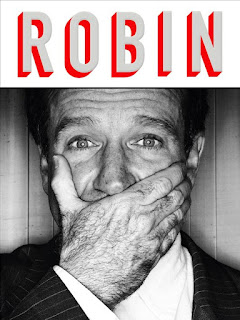 Someone once said of actors that they have their emotions much closer to the surface than the rest of us, in order to make them more easily accessible. If this is true, than it might be said that for some comedians their emotions are not just close to the surface, but raw and fully exposed.
Someone once said of actors that they have their emotions much closer to the surface than the rest of us, in order to make them more easily accessible. If this is true, than it might be said that for some comedians their emotions are not just close to the surface, but raw and fully exposed.
In the case of Robin Williams this certainly seems to have been the case. With Williams you always had the feeling that the more he exposed about himself and about the human condition, the more he made us see it and laugh about it, the more it took him to deep and dark places to find it.
With comedians it's often a question as to whether they are just reflective of the culture and the time they work in, or perhaps the way Lenny Bruce did, they actually help shape that culture.
For Williams the jury is still out. That’s why Dave Itzkoff’s new biography of Williams, Robin, is so important.
My conversation with Dave Itzkoff:
Thursday May 17, 2018
We Think It's Stormy Now.....1968 Was Far Worse....And We Survived
Thursday May 17, 2018
Thursday May 17, 2018
 Historians have long written about inflection points in history. In American history, events surrounding the Revolution, the War of 1812, the Civil War & Reconstruction, the Industrial Revolution, the Great Depression, and WWII, are all such points.
Historians have long written about inflection points in history. In American history, events surrounding the Revolution, the War of 1812, the Civil War & Reconstruction, the Industrial Revolution, the Great Depression, and WWII, are all such points.
It’s arguable that we may very well be living though another one right now. But clearly the last great historical inflection point came exactly fifty years ago, and reached its apogee in the year of 1968. Lyndon Johnson was President, and a series of events led us to believe like Yeats, “that the center cannot hold, and that mere anarchy was loose upon the land.”
The Tet Offensive, MLK and RFK assassinations, the Praque Spring, racial conflicts, the Democratic Convention in Chicago, Lyndon Johnson's decision not to seek reelection and the election of Richard Nixon and Spiro Agnew, made 1968 quite a year.
Lyndon Johnson presided over it all and that's the story that historian Kyle Longley tells in LBJ's 1968: Power, Politics, and the Presidency in America's Year of Upheaval
My conversation with Kyle Longley:
Wednesday May 16, 2018
If Gina Haspel is confirmed, will CIA torture begin anew?
Wednesday May 16, 2018
Wednesday May 16, 2018
 The debate over Gina Haspel running the CIA has, like most things, devolved into a partisan political debate: The usual tribes, the usual sides, and the usual arguments. But if we can only step back a bit, we see that it’s so much more. It goes to the heart of who we are as a nation, as a moral society, and whether we can ever again be that shining city on a hill.
The debate over Gina Haspel running the CIA has, like most things, devolved into a partisan political debate: The usual tribes, the usual sides, and the usual arguments. But if we can only step back a bit, we see that it’s so much more. It goes to the heart of who we are as a nation, as a moral society, and whether we can ever again be that shining city on a hill.
As the nomination becomes closer to a vote in the Senate, we’re going to talk about it with John Kiriakou, who was the first member of the intelligence community to expose the CIA’s use of torture, and as a result, became one of the very few Americans ever prosecuted under the Espionage Act, for which he served 23 months in federal prison.
My WhoWhatWhy.org conversation with John Kiriakou.
Wednesday May 16, 2018
The Moral Horror of Our Times
Wednesday May 16, 2018
Wednesday May 16, 2018
 Look at any days news output, and its getting harder and harder to separate fact from fiction. Not because of fake news, but because the real news and the actions of so many cross the bounds of credible behavior.
Look at any days news output, and its getting harder and harder to separate fact from fiction. Not because of fake news, but because the real news and the actions of so many cross the bounds of credible behavior.
As someone recently pointed out, after a few recent days of the usual craziness, if someone had submitted the days real events has a script or story idea for West Wing, or Homeland or even House of Cards, , it would have been rejected as too absurd.
The sad truth is that it’s really happening. This is why it’s sometimes necessary to look at it all in the realm of fiction or specifically a kind of meta fiction. This is what Laurie Calhoun does in her novel You Can Leave.
My conversation with Laurie Calhoun:
Tuesday May 15, 2018
Moore's Law Does Not Apply To Relationships
Tuesday May 15, 2018
Tuesday May 15, 2018
 It’s become a cliche, but the fact is that in just the past 10 years, almost everything we do has changed. From the way we drive, take pictures, communicate, shop, to the way we seek relationships.
It’s become a cliche, but the fact is that in just the past 10 years, almost everything we do has changed. From the way we drive, take pictures, communicate, shop, to the way we seek relationships.
What hasn’t changed is the fundamental underlying idea of human relationships. Connecting, relating and maybe even falling in love. It’s probably a good thing that evolutionary biology is not subject to Moore's Law.
So how do we reconcile the two? How does Tinder or Match or Bumble sync up with our human needs, which have not really changed all that much in thousands of years? Trying to tie these threads together is Joanna Coles in her new book Love Rules: How to Find a Real Relationship in a Digital World
My conversation with Joanna Coles:
Saturday May 12, 2018
Globalization and its Discontents
Saturday May 12, 2018
Saturday May 12, 2018
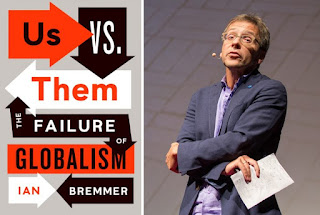 Trump, Brexit, and the worldwide populist revolution are not causes, but symptoms. Symptoms of a wider systemic plague of fear of change, anxiety, and a feeling by people of being part of a world they no longer can control or even understand.
Trump, Brexit, and the worldwide populist revolution are not causes, but symptoms. Symptoms of a wider systemic plague of fear of change, anxiety, and a feeling by people of being part of a world they no longer can control or even understand.
Technology today, rather than being a cause, is merely the host that carries the fear. Not unlike the Industrial Revolution a century ago, disruptive change takes its toll. The difference now is that it all happens at hyper speed, and in full view 24/7. How we deal with it, whether we put those that have been left behind in Hillary Clinton’s basket of deplorables, or find leadership that will lift up entire countries may very well determine the fate of the world.
Ian Bremmer, the president and founder of Eurasia Group is more on point than most in understanding all this is going on. He explains a big part of it in Us vs. Them: The Failure of Globalism.
My WhoWhatWhy.org conversation with Ian Bremmer:
Tuesday May 08, 2018
Freedom, Liberty & America...A Look Back
Tuesday May 08, 2018
Tuesday May 08, 2018
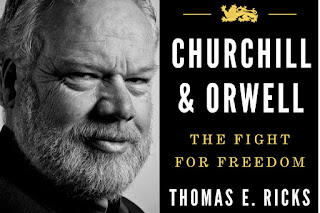 In his book Profiles in Courage, JFK writes that courage exists “when a man does what he must — in spite of personal consequences, in spite of obstacles and dangers, and pressures — and that is the basis of all human morality.”
In his book Profiles in Courage, JFK writes that courage exists “when a man does what he must — in spite of personal consequences, in spite of obstacles and dangers, and pressures — and that is the basis of all human morality.”
It’s hard to even think about this in the realm of pubic life in 2018. A time when courage is in short supply, reality is subjective and facts are not the “stubborn things” that John Adams said they were, but merely fungible talking points to gin up the base.
It’s sad then that we have to rely almost solely on history to find examples of this courage and morality. That’s where multiple Pulitzer Prize winning journalist Thomas Ricks tanks us in his joint biography Churchill and Orwell: The Fight for Freedom
My conversation with Thomas Ricks:
Thursday May 03, 2018
Dear Madam President
Thursday May 03, 2018
Thursday May 03, 2018
 There is a line from the 1973 movie The Way We Were, where Katie Morosky, played by Barbra Streisand, talks about Hubbell Gardner, played by Robert Redford. She says of Gardner/Redford, “In a way he was like the country he lived in; everything came too easily to him.”
There is a line from the 1973 movie The Way We Were, where Katie Morosky, played by Barbra Streisand, talks about Hubbell Gardner, played by Robert Redford. She says of Gardner/Redford, “In a way he was like the country he lived in; everything came too easily to him.”
And that has been a narrative, albeit, often a false one, of ease and grace that the public often seeks to buy into with respect to its leaders. Certainly Kennedy successfully exploited it, maybe even laid the political predicate for it, in his race against Nixon in 1960. In a way it was even a part of the Obama narrative.
On the flip side, it may have very well worked against Hillary Clinton in 2016. It seems that for Hillary Clinton, nothing came easily. Everything she had ever achieved was, or appeared to be, a struggle. One that played out on the public stage for more than 40 years.
Jennifer Palmieri got to see this up close and personal as Hillary Clinton’s Communications Director, and herself a veteran of many years in politics and in the White House. She brings it all into focus in her new book Dear Madam President: An Open Letter to the Women Who Will Run the World
My conversation with Jennifer Palmieri:
Thursday May 03, 2018
The Fragility of Hope
Thursday May 03, 2018
Thursday May 03, 2018
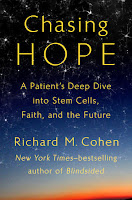 Woody Allen once said that the world was divided into the horrible and the miserable. The horrible he thought were people with terminal cases, blind people, and the crippled. “I don't know how they get through life,” he said. “It's amazing to me.”
Woody Allen once said that the world was divided into the horrible and the miserable. The horrible he thought were people with terminal cases, blind people, and the crippled. “I don't know how they get through life,” he said. “It's amazing to me.”
To answer Woody Allen's existential question, it is usually hope that carries the day. But the form that that hope takes can vary widely. Sometimes, it grows out of faith, sometimes out of denial and sometimes out of science. This is often true for both real cutting edge science, or the placebo that is most Western medicine.
Author and journalist Richard M. Cohen, has long lived with conditions Woody Allen would call horrible. Yet though his writings and his voice, he has not only defined his hope, he has given it to others. He does so once again in his look at stem cell research in Chasing Hope: A Patient's Deep Dive into Stem Cells, Faith, and the Future.
My conversation with Richard M. Cohen:
Thursday May 03, 2018
Why We Have More Time to Have No Time
Thursday May 03, 2018
Thursday May 03, 2018
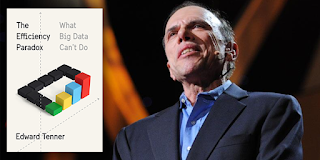 Isn’t it interesting that the more we have technology to save us time, the more we complain about not having enough time. Before the digital revolution we never heard as much talk about everyone not having enough time.
Isn’t it interesting that the more we have technology to save us time, the more we complain about not having enough time. Before the digital revolution we never heard as much talk about everyone not having enough time.
Just think about how much time we spend setting up our CRM and To do list apps, when a simple list in a notebook might have actually been faster.
And while the technology of everything from dating apps to GPS, may make things more efficient, do they actually limit our ability to see the wider world, and in so doing make us cogs in a wheel that sacrifice our humanity and our sense of wonder. That what author and distinguished scholar Edward Tenner looks at in The Efficiency Paradox: What Big Data Can't Do
My conversation with Edward Tenner:
Monday Apr 30, 2018
Immigration and the False Lure of the American Dream
Monday Apr 30, 2018
Monday Apr 30, 2018
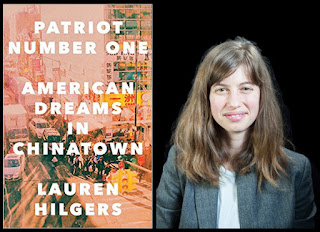 There is not a day that goes by that the subject of immigration is not in some way part of our national discussion. However, even with all the talk, there is little focus on either the large number of immigrants that arrive from China, or on the their immigrant experience.
There is not a day that goes by that the subject of immigration is not in some way part of our national discussion. However, even with all the talk, there is little focus on either the large number of immigrants that arrive from China, or on the their immigrant experience.
We think very little about what it must be like leaving one's country, friends, family and culture behind, to begin anew as a stranger in a strange land.
Perhaps if we all understood the commitment, the bravery, the strength it takes to do that, we would be having a very different conversation about immigration.
That experience is the world that Lauren Hilgers gives up a window into in Patriot Number One: American Dreams in Chinatown
My conversation with Lauren Hilgers:
Friday Apr 27, 2018
An Important Day In The Life of Robert F. Kennedy
Friday Apr 27, 2018
Friday Apr 27, 2018
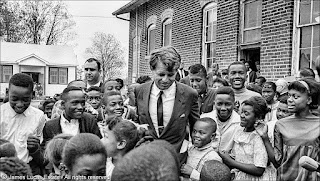 In 1964 Lyndon Johnson enacted his war on poverty. Three years later Robert Kennedy knelt in a crumbling shack in Mississippi, watching a toddler pick rice and beans off of a dirt floor. What Robert Kennedy saw on that trip would impact him personally and in part, drive is run for the Presidency one year later.
In 1964 Lyndon Johnson enacted his war on poverty. Three years later Robert Kennedy knelt in a crumbling shack in Mississippi, watching a toddler pick rice and beans off of a dirt floor. What Robert Kennedy saw on that trip would impact him personally and in part, drive is run for the Presidency one year later.
While Vietnam was the seminal issue of the day, poverty and its nexus with the civil rights movement, were very much on Kennedy’s mind.
Ellen Meacham takes us back to this transformative moment for RFK in Delta Epiphany: Robert F. Kennedy in Mississippi.
My conversation with Ellen Meacham:
Wednesday Apr 25, 2018
The 75-Year-Old Book That Drives Our Politics Today
Wednesday Apr 25, 2018
Wednesday Apr 25, 2018
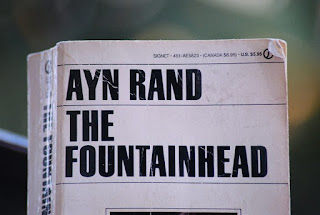 The legendary studio boss Harry Cohn once said to one of his writers, that if you want to send a political message, use Western Union. The point was that movies were for entertainment. Some have even tried to make that argument with respect to novels, but over the years, this has hardly been the case.
The legendary studio boss Harry Cohn once said to one of his writers, that if you want to send a political message, use Western Union. The point was that movies were for entertainment. Some have even tried to make that argument with respect to novels, but over the years, this has hardly been the case.
One of the great examples is Ayn Rand’s The Fountainhead. Released 75 years ago, this month. This story of ambition, love, and architecture reverberates through our political discourse today, both in middle America and in the halls of Congress. What other 75-year-old novel can spark a heated debate between Paul Ryan and Paul Krugman?
Yaron Brook is an Israeli American entrepreneur and writer. He’s the current chairman of the board of the Ayn Rand Institute where he was its executive director from 2000 to 2017 and is leading the effort to mark the 75th anniversary of The Fountainhead.
My WhoWhatWhy.org conversation with Yaron Brook:
Wednesday Apr 25, 2018
Wednesday Apr 25, 2018
 Emma Gonzalez and David Hogg understood how to maximize social media to achieve the highest in democratic ends. The Russians and Cambridge Analytica used that same social media to undermine democracy, to spread lies, and to manipulate facts.
Emma Gonzalez and David Hogg understood how to maximize social media to achieve the highest in democratic ends. The Russians and Cambridge Analytica used that same social media to undermine democracy, to spread lies, and to manipulate facts.
Recently we’ve seen Mark Zuckerberg and members of Congress musing about the business model of Facebook and the holy grail of hyper-directed advertising. All of this, good and bad, misses the larger point.
In a world that is totally interconnected, when every aspect of Internet culture feeds steroids to the human tribal instinct, when information moves at the speed of light, and when there is more of it than we have the evolutionary ability to process, is this technology simply antithetical to traditional ideas of democracy? Particularly to the system that our founders passed down to us.
Perhaps it’s no coincidence that as the Internet grows, so to do authoritarian regimes. As tech companies get bigger, democratic institutions become smaller. What is the nexus to all of this and if it’s true, do we have to change tech or change the very idea of democracy?
All of this is at the core of work by Jamie Bartlett in his book The People Vs Tech: How the internet is killing democracy (and how we save it)
My WhoWhatWhy.org conversation with Jamie Bartlett:
Friday Apr 20, 2018
Neuroscience is The New Moneyball
Friday Apr 20, 2018
Friday Apr 20, 2018
I think it was Howard Cosell who first referred to sports at the “toy department of life.” Oftentimes player performance has been put down as people say that “it’s not rocket science.”
The fact is however, that we now know it is neuroscience, computer science, medical science, AI, and a whole lot more.
We often talk about the game of golf as being so much inside the heads of players. But now, new research show us that this is just as true for football, basketball, and especially baseball.
The metrics that drove Moneyball, have now been amplified to include new arenas of scientific data. This data may be the handicapping tools and tip sheets for the future of sports. Zach Schonbrun takes us inside this new science in The Performance Cortex: How Neuroscience Is Redefining Athletic Genius.
My conversation with Zach Schonbrun:
Tuesday Apr 17, 2018
Tuesday Apr 17, 2018
In the movie Jurassic Park, perhaps the most famous line is that “nature will find a way.” It might just as accurately be said today, that technology will find a way.
Think about where we are. Fear of Facebook, the attacks on Amazon, the opioid crisis, and the kind of mini “techlash” we’re going through and the anger of a great many voters in former manufacturing hubs like Michigan, Pennsylvania or Wisconsin. It all stems from the degree to which technology is displacing almost every aspect of society. And if this is where we are now, just wait until it really kicks in.
Then, maybe the idea of a Universal Basic Income, may finally come into its own. Not as a form of welfare, but as a pro growth, pro business policy.
To help understand this, Andrew Yang spells it all out in The War on Normal People: The Truth About America's Disappearing Jobs and Why Universal Basic Income Is Our Future.
My conversation with Andrew Yang:
Wednesday Apr 11, 2018
From The Crusades To The Holocaust: Why History and Love Stories Matter
Wednesday Apr 11, 2018
Wednesday Apr 11, 2018
 Religion, violence, anti-semitism, and the fate of the Catholic Church. All subject as contemporary as today’s headlines. To often we see these headlines and think about these issues in the moment, in the now. Yet to really understand any of these issues, begs for a deeper understanding of history.
Religion, violence, anti-semitism, and the fate of the Catholic Church. All subject as contemporary as today’s headlines. To often we see these headlines and think about these issues in the moment, in the now. Yet to really understand any of these issues, begs for a deeper understanding of history.
And what better way to get that history, then in the storytelling of a great novel. That’s what James Carroll has been helping us with for years. Teaching us, while he entertains us.
James Carroll is a distinguished scholar in residence at Suffolk University and a columnist for The Boston Globe. He is the author of ten novels and seven works of nonfiction. He is a winner of the National Book Award, the best selling author of Constantine’s Sword and his latest work is The Cloister
My conversation with James Carroll:
Friday Apr 06, 2018
Tribes May Be Killing Our Politics, But They May Be The Cure for Depression
Friday Apr 06, 2018
Friday Apr 06, 2018
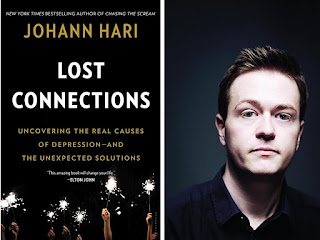 Spend any time watching television and you’ll see the apotheosis of western medicine. There is a drug for everything. We live in a pharmaceutical culture where every pain, ache, and known and unknown disease has its own pill.
Spend any time watching television and you’ll see the apotheosis of western medicine. There is a drug for everything. We live in a pharmaceutical culture where every pain, ache, and known and unknown disease has its own pill.
The areas of mental health, depression and anxiety have become a kind of hedge fund for the drug companies. And while we see the occasional pushback to this western model of drug care, we don’t see it enough in the world of mental health and depression.
Distinguished journalist Johann Hari thinks there is a better way to treat depression and it’s one that takes into account the reality of the world we live in. He sets out to prove it in is new book Lost Connections: Uncovering the Real Causes of Depression – and the Unexpected Solutions
My conversation with Johann Hari:
Wednesday Apr 04, 2018
What Maxed Out Political Corruption Looks Like
Wednesday Apr 04, 2018
Wednesday Apr 04, 2018
 Lately, there have been countless articles about the rise of authoritarian regimes. One aspect of all of these regimes is, even as we’re seeing here in America, the dramatic extremes in corruption. Often fueled by power, money laundering, drugs, and simply all manner of crimes upon the public.
Lately, there have been countless articles about the rise of authoritarian regimes. One aspect of all of these regimes is, even as we’re seeing here in America, the dramatic extremes in corruption. Often fueled by power, money laundering, drugs, and simply all manner of crimes upon the public.
Perhaps nowhere in contemporary times was this worse than in Columbia in the 1990s and 2000s. Amidst a complicated, murky civil war, drug cartels, corruption and unrestrained violence, the country came apart.
What exactly happened, where is it today and what we can learn from it, is the subject a new and powerful book by Peruvian-American activist/writer Maria McFarland Sánchez-Moreno entitled There Are No Dead Here: A Story of Murder and Denial in Colombia.
My conversation with Maria McFarland Sánchez-Moreno:
Thursday Mar 29, 2018
Thursday Mar 29, 2018
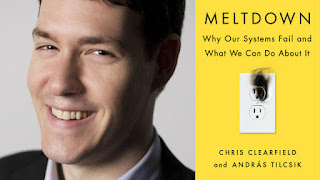 I don’t think there is anyone that would argue that the world is a far more complex place today. All of the machines and technology that are supposed to make our lives easier have, at times, made it more complicated, more frustrating, and more subject to things going wrong.
I don’t think there is anyone that would argue that the world is a far more complex place today. All of the machines and technology that are supposed to make our lives easier have, at times, made it more complicated, more frustrating, and more subject to things going wrong.
Anyone who’s tried to operate the GPS or radio in a new BMW, or even to operate their television knows exactly what I mean.
This is not just about technology and algorithms. It’s also about the systems and organizations that make our world work. We have embraced complexity as an operating system, but we have yet to build into that complexity the fail safe systems that prevent all of it from spiraling out of control.
We seem to be at a critical juncture. We have designed so much that can go wrong, and have yet to design the internal systems that can prevent it. For complexity, it’s both the best and worst of times. Until we figure it all out, a Meltdown is around every corner. That's the title of a new book co-authored by Chris Clearfield.
My conversation with Chris Clearfield:
Tuesday Mar 27, 2018
The Israel of 1948 is Over: A conversation with Avraham Burg
Tuesday Mar 27, 2018
Tuesday Mar 27, 2018
 Back in the 1960s, Richard Nixon would talk and write a lot about the Middle East in general, and about the Israeli situation specifically, and he talked about how it easily could become the flash point of the next world war.
Back in the 1960s, Richard Nixon would talk and write a lot about the Middle East in general, and about the Israeli situation specifically, and he talked about how it easily could become the flash point of the next world war.
Certainly almost 60 years and many crises later, this is still true. Today, as a second and third generation still hears about settlements and a one and two-state solution, and peace plans are reconstituted over and over again, one wonders, do we even remember how this all got started?
Does the original sin grow out of the post-World War I agreements of 1916, or did something happen after Israel’s success in the Six-Day War, in 1967? Did Israel, to paraphrase our current President, get “tired of winning”?
So one more time, we’re going to go back and look at the past, the present, and the future of the Israeli enterprise. This time, with Avraham Burg. One time Speaker of the Israeli Knesset. He’s a past leader of the World Zionist Federation and the Jewish Agency for Israel. He served in the Israeli Labor Government of Shimon Peres, and back in 2004, he retired from active involvement in politics and is the author of In Days to Come: A New Hope for Israel.
Monday Mar 26, 2018
The Power of Stories to Shape People, History, Civilization
Monday Mar 26, 2018
Monday Mar 26, 2018
 Every so often the media picks up the meme that books and readers are on the decline. That our short attention span, along with our Twitter and Facebook driven culture, has supplanted long form narrative. And it seems that every time those stories circulate, something happens to change or debunk the narrative. Even the national obsession with a book like Fire and Fury, proves something.
Every so often the media picks up the meme that books and readers are on the decline. That our short attention span, along with our Twitter and Facebook driven culture, has supplanted long form narrative. And it seems that every time those stories circulate, something happens to change or debunk the narrative. Even the national obsession with a book like Fire and Fury, proves something.
Joan Didion said that we tell each other stories in order to live. It’s also those stories, in literature, in popular fiction, or even nonfiction, that still, after all these centuries, shape how the world continues to unfold. That’s the journey that Martin Puchner takes us on in The Written World: The Power of Stories to Shape People, History, Civilization.
My conversation with Martin Puchner:
Wednesday Mar 21, 2018
Why Economic Inequality Can Take Down Our Republic
Wednesday Mar 21, 2018
Wednesday Mar 21, 2018
 What is the nexus between our political system and our economic system? Certainly during the Cold War we fought to defend our political system against the economic threat of communism. So, does it work the other way around? Do we now have to defined our republic and our democracy against the threat of a new gilded age, of oligarchs and of deep income inequality? Is the fight for civility and justice, also a fight for economic justice.
What is the nexus between our political system and our economic system? Certainly during the Cold War we fought to defend our political system against the economic threat of communism. So, does it work the other way around? Do we now have to defined our republic and our democracy against the threat of a new gilded age, of oligarchs and of deep income inequality? Is the fight for civility and justice, also a fight for economic justice.
In a system designed to be class blind, can the widening economic divide actually bring down the system?
The way in which these political and economic ideas are related, is the basis of Ganesh Sitaraman's new book The Crisis of the Middle-Class Constitution: Why Economic Inequality Threatens Our Republic.
My conversation with Ganesh Sitaraman:
Tuesday Mar 20, 2018
Growing Up Muslim: The Everyday Lives of Muslim American Teenage Boys.
Tuesday Mar 20, 2018
Tuesday Mar 20, 2018
 Everyday we are reminded how difficult it is growing up, and being a teenger. The work of Jean Twenge and others has shown the impact of technology and social media on our culture. Add to this, the reality of what it’s like growing up black or hispanic in America and the pressure becomes even more intense..
Everyday we are reminded how difficult it is growing up, and being a teenger. The work of Jean Twenge and others has shown the impact of technology and social media on our culture. Add to this, the reality of what it’s like growing up black or hispanic in America and the pressure becomes even more intense..
Even tougher, imagine what it must be like growing up in America as a Muslim teenager.. particularly one who cares about their religious practices and so must walk that fine line between wanting to fit in and still trying to maintain their Muslim identity.
John O’Brien, went directly into the heart of a Muslim community to understand what all of this translates to in the everyday lives of these Muslim teenage boys. He shares that journey in Keeping It Halal: The Everyday Lives of Muslim American Teenage Boys.
My conversation with John O'Brien:
Monday Mar 19, 2018
Can The Behavior of School Shooters Be Profiled and Shootings Averted?
Monday Mar 19, 2018
Monday Mar 19, 2018
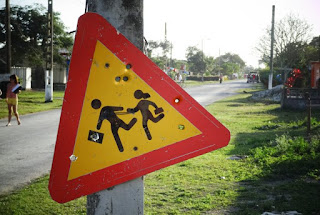 There is no question that the easy availability of guns, especially assault weapons, has contributed in some way to the rash of school shootings. However, we would be naïve to think that this is the totality of the problem. Beyond guns, the broader questions always should be how these shootings can be averted. How can we understand and interpret the data from so many past events in ways that help us to prevent the next? In a world where big data is becoming the holy grail, can this data be used to keep our students safe?
There is no question that the easy availability of guns, especially assault weapons, has contributed in some way to the rash of school shootings. However, we would be naïve to think that this is the totality of the problem. Beyond guns, the broader questions always should be how these shootings can be averted. How can we understand and interpret the data from so many past events in ways that help us to prevent the next? In a world where big data is becoming the holy grail, can this data be used to keep our students safe?
Jeff Daniels is a Professor of Counseling at West Virginia University and his work in research on averting school shootings is groundbreaking. His recent article in the academic journal The Conversation is entitled “If You Want To Know How To Stop School Shootings, Ask The Secret Service.”
My WhoWhatWhy.org conversation with Professor Jeff Daniels
Friday Mar 16, 2018
Timothy Leary and Richard Nixon, Together Again
Friday Mar 16, 2018
Friday Mar 16, 2018
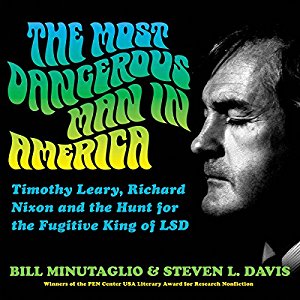 Every day the news gets darker. Polarization is increasing, constitutional norms are being overthrown, the social fabric is tearing and as Yeats said, “the best lack all conviction while the worst are full of passionate intensity.”
Every day the news gets darker. Polarization is increasing, constitutional norms are being overthrown, the social fabric is tearing and as Yeats said, “the best lack all conviction while the worst are full of passionate intensity.”
Still, as bad as it appears on cable news each night, it’s nothing compared to what was happening in the 60’s and 70’s. Cities were burning, violence was loose upon the land. Nixon was drinking himself to sleep each night, and new villains had to be created to take the heat off Watergate and Vietnam. For Nixon, one of those villains became Timothy Leary.
The story of Leary, the enemy that Nixon created to embody all that he thought wrong with the country, is story that is a little bit Wag the Dog, Keystone Cops and All The President's Men.
The story is that Steven L. Davis and Bill Minutaglio tell in The Most Dangerous Man in America: Timothy Leary, Richard Nixon and the Hunt for the Fugitive King of LSD.
My conversation with Steven L. Davis:
Wednesday Mar 14, 2018
Wednesday Mar 14, 2018
We often hear that we live in a post industrial world. Yet all of those consumer goods we and the rest of the world love so much, are made in factories. Factories that, at the dawn of the industrial revolution, did not always represent the best of working conditions. Today, out of nostalgia, we romanticize them and long for the “big shoulders” of the industrial heartland.
Today things are still produced in factories. However, they are increasingly either located offshore, or are more and more manned by robots. Auto workers from the 50s and 60s would be shocked walking through the factory that turns out Teslas.
Yet in the minds of many, these factories represented something more than just places to make things. They were a symbol of another time and place. But one that we can still learn from, even in the digital age.
Few know more about his, than my guest Joshua Freeman the author of Behemoth: A History of the Factory and the Making of the Modern World.
My conversation with Joshua Freeman:
Tuesday Mar 06, 2018
#MeToo in China
Tuesday Mar 06, 2018
Tuesday Mar 06, 2018
 We hear over and over again that the future belongs to China. Looking at what the Chinese are accomplishing in both infrastructure and technology, it’s easy to believe it. But what about in human relations and the issues of the gender wars?
We hear over and over again that the future belongs to China. Looking at what the Chinese are accomplishing in both infrastructure and technology, it’s easy to believe it. But what about in human relations and the issues of the gender wars?
As the #MeToo movement reshapes or recalibrates the nature of sex, work and gender relationships in America, it’s worthwhile to look and see how and if these same issues are playing out in China.
In China, an entire cadre of well educated and financially successful woman are taking their place. The result is that the deep, deep traditions of Chinese society are having to change in ways that are even more difficult and upending than all than all the physical changes China has endured.
Taking us through this journey is Economist correspondent Roseann Lake in Leftover in China: The Women Shaping the World's Next Superpower.
My conversation with Roseann Lake:
Wednesday Feb 28, 2018
Maybe You Are Doing Everything Wrong At Work
Wednesday Feb 28, 2018
Wednesday Feb 28, 2018
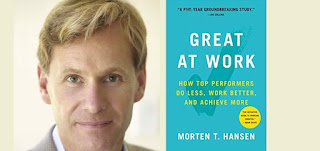 A couple of weeks ago, The N.Y. Times ran a story about “global nomads.” People whose work allows them to plug-in anywhere in the world. This may not be for everybody. But it’s a reminder that the fundamentals of work are changing.
A couple of weeks ago, The N.Y. Times ran a story about “global nomads.” People whose work allows them to plug-in anywhere in the world. This may not be for everybody. But it’s a reminder that the fundamentals of work are changing.
How do we work today in an always on, 24/7 world. In a world where intellectual capital is increasingly the coin of the realm, we are essentially at work. whenever we are awake. and maybe even as we sleep.
All of this change arguably creates the need for a rebalancing of our relationship to work. Even redefining what the word “work,” really means. Always changing is how we determine priorities, how generational dynamics impact work, and and is the cliche of work/life balance even a thing anymore.
There is no better person to talk to about all of this than author, professor and management guru Morten Hansen. His latest is Great at Work: How Top Performers Do Less, Work Better, and Achieve More.
My conversation with Morten Hansen:
Monday Feb 26, 2018
Political Tribes: A Conversation with Amy Chua
Monday Feb 26, 2018
Monday Feb 26, 2018
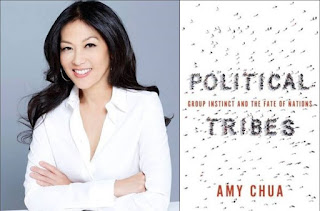 In the debate about immigration we are reminded of the original notion of America as a melting pot. As a nation that could absorb different cultures, different identities and different ethnic groups.
In the debate about immigration we are reminded of the original notion of America as a melting pot. As a nation that could absorb different cultures, different identities and different ethnic groups.
The trade off was the embrace of an American identity. A kind of super nationalism that would subsume these subgroups and, at its best, world supersede ethnic and religious tribalism, and replace it all with the American brand.
Over the years we’ve seen fissures in this idea. Usually it happens when dramatic change or pressure comes to America. The onset of the industrial revolution and the Cold War against communism are some examples. We’ve always done better when we’ve had common external enemies.
But today, the pressures may be just too great. Globalization and the decline of nation states, greater economic inequality, a 24/7 always connected culture, and the rush of change, both social and technological, and at a dizzying pace, have all stoked fear, uncertainty and insecurity. The result is that it feeds a new kind of tribalism that Americans may never have experienced before.
To help us understand this, as well as the very idea of tribalism I’m joined by best selling author and Yale law professor, Amy Chua to talk about Political Tribes: Group Instinct and the Fate of Nations.
My conversation with Amy Chua:
Friday Feb 23, 2018
Who Was Edward Lansdale, and Why It Matters: A Conversation with Max Boot
Friday Feb 23, 2018
Friday Feb 23, 2018
 There was a saying during the Vietnam era, the attribution of which is a bit fuzzy, that said “if you grab them by the balls, their hearts and minds will follow.”
There was a saying during the Vietnam era, the attribution of which is a bit fuzzy, that said “if you grab them by the balls, their hearts and minds will follow.”
I suppose this was not inconsistent with another quote of that era that said, “come let us reason together...or we’ll burn down your village.”
Vietnam, like so many counterinsurgency efforts, before and since, was or should have been, about winning those hearts and minds. Unfortunately, the political, foreign policy and military establishment never seemed to get it right.
However, during the Vietnam era, one man did. He was Maj. General Edward Lansdale. He was military and CIA, and in retrospect he maybe the only true wise man of the time.
Now, foreign policy scholar Max Boot gives us The Road Not Taken: Edward Lansdale and the American Tragedy in Vietnam. The fist full look at Lansdale and why this obscure figure from the period, should be a household,
My conversation with Max Boot:

